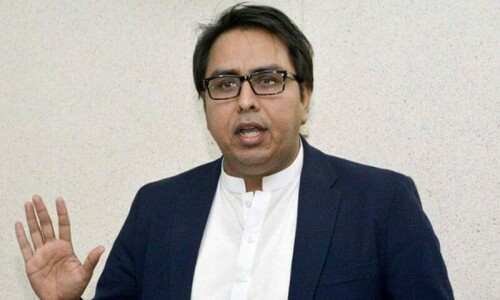PEN: Recently married, Namrata Raut returned to her family home in rural western India to paint hundreds of Ganesha idols ahead of a major Hindu festival celebrating the elephant-headed deity.
Pen, in Maharashtra state, is renowned for its exquisitely designed and beautifully coloured statues of the auspicious god, which are sold around the world providing the lifeblood of this small community.
"There are about 350 workshops in the town and they all require many artists," Raut tells AFP, putting the finishing touches on another brightly painted carving of Hinduism's most recognisable god.
"I got married a month ago and live in Mumbai now but I've returned to help out. The industry is key to people's livelihoods here. It fills the stomachs of families," the 28-year-old adds.
 |
| Namrata Raut gives the finishing touches to a plaster idol of the elephant-headed Hindu God of prosperity, Lord Ganesha at a workshop in Pen village. ─ AFP |
Ganesh Chaturthi is a hugely popular 11-day religious celebration that honours Ganesha, the son of Lord Shiva and the goddess Parvati. The festival is celebrated annually across India and is marked by Hindus in every corner of the globe.
In the weeks leading up to Ganesh Chaturthi around 250,000 idols are made in workshops lining the streets of Pen, a town of 30,000 people around 75 kilometres (50 miles) outside Mumbai.
The idols depict the one-tusked, four-armed Ganesha sitting holding a sweet delicacy.
 |
| An Indian artist gives the finishing touches to a plaster idol of the elephant-headed Hindu God of prosperity, Ganesha ─ AFP |
While some artisans operate all year round, the majority, like Raut, work part-time for the cottage industry, in seasonal employment that dominates the rural economy of India.
 |
| Workers carry a plaster idol of Ganesha for delivery from a workshop in Pen village. ─ AFP |
Her father's workshop sells about 2,500 idols every season. The statues are made from clay or plaster and dipped in a white coating before being painted exactly to the customer's specifications.
Sagar Pawar, the owner of one of Pen's largest Ganesha idol-making factories, says his workshop churns out 25,000 statues every year, some of which are sent abroad. “"Just in this year we have sold our Ganesha idols in London and in America also," Pawar tells AFP proudly.
In another workshop just around the corner, Dipak Samel points to a glass cabinet containing an elaborately-painted sculpture of the elephant god, unusually with a feather attached. "This one is going to Bangkok," he says.
 |
| An Indian artist gives the finishing touches to idols of the elephant-headed Hindu God of prosperity, Lord Ganesha. ─ AFP |
"My store has been in operation for 60 years. We make idols ranging in size from six inches to twelve feet, costing between 50 and 30,000 rupees," Samel explains.
This year's Ganesh Chaturthi runs from September 17 to 27 and culminates with the idols being ritually immersed in water.
Mumbai, India's commercial capital, traditionally hosts some of the largest gatherings with tens of thousands dipping idols in the Arabian Sea at beaches along the city's coast.
 |
| An artist gives the finishing touches to a plaster idol of the elephant-headed Hindu God of prosperity, Lord Ganesha at a workshop in Pen village. ─ AFP |
In recent years there has been a drive by activists to raise awareness of the environmental damage that the immersion causes.
 |
| Dilip Raut dusts plaster idols of the elephant-headed Hindu God of prosperity, Lord Ganesha at a workshop in Pen village. ─ AFP |
The workshops in Pen are taking note, increasingly making eco-friendly idols out of natural clay that dissolve in water rather than less biodegradable plaster. They are also turning to non-toxic watercolours and natural products such as turmeric and multani mitti, a light clay popularly used in skin care, rather than chemical paints to colour the statues.
 |
| Indian artists paint plaster idols of the elephant-headed Hindu God of prosperity, Lord Ganesha at a workshop - AFP PHOTO/ INDRANIL MUKHERJEE |
"Customers want eco-friendly idols now," says Pawar.













































